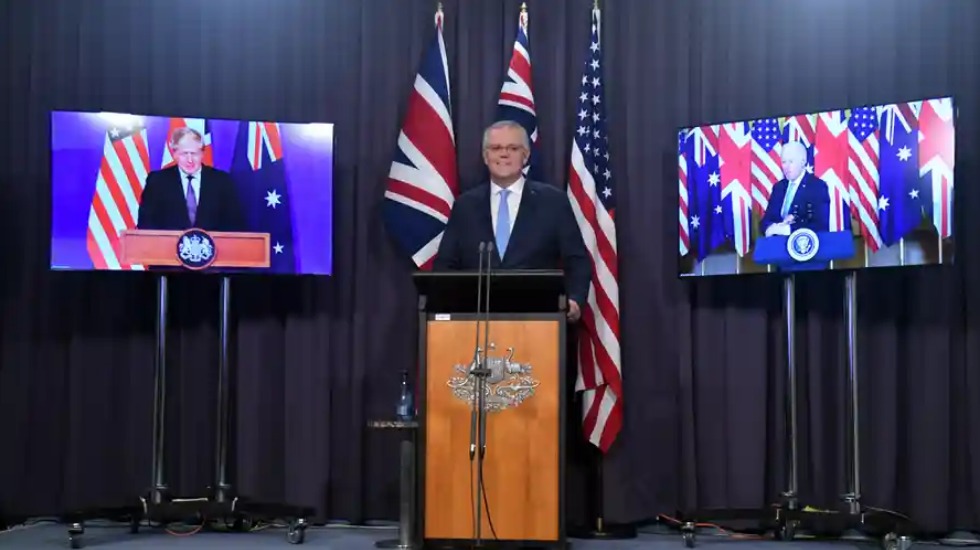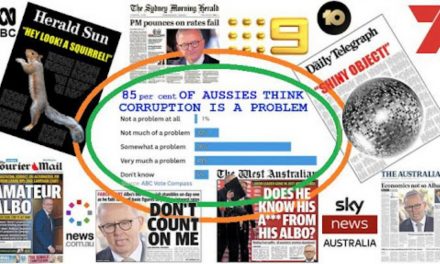Prime Minister Scott Morrison (centre) flanked by UK PM Boris Johnson (left) and US President Joe Biden at this week’s AUKUS announcement. Photo: AAP
It’s been a big few days for the US-Australian alliance.
This week, US President Joe Biden, UK Prime Minister Boris Johnson and Australian Prime Minister Scott Morrison announced a new security alliance – AUKUS. Under the ‘fella from down under’, as Biden called him, Australia is going nuclear.
We’ll be getting nuclear-powered subs for the first time, joining a very short list of countries with that capability.
It’s a big deal, with huge implications for the future of Australia and our region. It also came as a big
surprise – we only heard whispers of what was coming a few hours before the announcement. And as usual, we didn’t get any say in it at all.
So what does this tell us about our relationship with the United States? In some ways, not much.
Since Australia first signed on to a security alliance with the United States 70 years ago, the trajectory has always been towards deeper security enmeshment. This is just another step along that path, tying us more closely to the United States and making it even more certain (as if it wasn’t already) that Australia will follow the US in to any conflict, regardless of where, or why, or of the consequences.
The fact that this has happened under Biden, though, might be a little surprising. Many Australians might have thought that we were in for something a bit different under his presidency.
Until this week, it was widely assumed that the Biden administration and the Morrison government were heading for some kind of clash over climate, not that we’d be gifted closely-guarded American and British nuclear tech.
In fact, as soon as Biden was elected, there was a clear and immediate shift in the media narrative here in Australia. The very first question Morrison was asked when he held a press conference to congratulate president-elect Biden was about climate change – a dramatic shift in the focus of coverage of the alliance. After the media’s laser-like focus on Trump and only Trump, new questions appeared.
Just how much would the incoming Biden administration influence Australian climate policy?
Given Biden’s clear commitment to significant action on climate, and Australia’s extremely close relationship with the United States, the implication of that question – and, I think it’s safe to say, the hope of many Australians – was that the influence would be significant.
The widespread assumption then, and possibly even now, is that the Australian government would be dragged kicking and screaming towards action on climate by our most important security ally. That’s not an unreasonable hope – Australian governments do, after all, have a long history of following the United States’ lead.
And in the case of climate, it’s not just the United States the Australian government is up against – it’s pretty much all of our allies and, importantly, our major trading partners.
In the UK – our other great historic security provider – the Conservative government has commitment to dramatic emissions reductions of 78 per cent by 2035. Japan, South Korea, China, New Zealand, and Canada all have net-zero targets.
All of this has only increased global perceptions of Australia as, in the words of CNN, the ‘villain’ of global climate policy.
So the pressure, it seems, is mounting – as is the sense that the Morrison government will have no choice but to cave in. As, it must be said, it absolutely should. The moral, economic, and security imperative for acting on climate is clear, and it has been for a long time.
But progress in Australian climate policy is far from inevitable.
As much as we might want it to be the case, and despite the steady trickle of media articles outlining increased diplomatic ‘pressure’ on the Australian government, the signs that it won’t work were pretty clear even early on.
PLEASE HELP US CONTINUE TO THRIVE BY BECOMING AN OFFICIAL FOOTYOLOGY PATRON. JUST CLICK THIS LINK.
In the lead-up to Morrison’s much-anticipated first meeting with President Biden at the G7 in Cornwall in June this year, for example, much of the focus was on how awkward their conversation about climate policy would be. When Morrison didn’t get a one-on-one meeting, that was largely assumed to be a subtle dig at him.
We know, now, that it wasn’t. And we also know that in the meeting Morrison did have with Biden and British PM Boris Johnson, climate didn’t come up.
And nor was climate really the focus of Biden’s whole trip, despite his apparent commitment to US ‘leadership’ on the issue. Instead, he focused on China, and a familiar American narrative of freedom versus autocracy. That suited the Morrison government very well.
It was on that same trip that Morrison and Johnson ceremoniously swapped Tim Tams for Penguins, announcing a new UK-Australia trade deal. Here was another opportunity, it seemed, for one of Australia’s close allies to influence its climate policy – this time through trade, rather than direct diplomacy.
Funnily enough, when it came down to it, that fell through, too. Last week, it was revealed that British negotiators had agreed to significantly soften language around climate change in the text of the deal, bowing to Australian pressure. Johnson and his ‘global Britain’ needed the trade agreement more than he needed to save the planet, apparently.
This might be devastating to those of us who care about stopping catastrophic climate change, but it shouldn’t be surprising. Neither of those relationships – with the US, or the UK – are set up to be able to properly deal with an existential threat like this.
As the last few days have shown, their interests are in ‘hard’ questions of security and economics – in preserving their power – not ‘soft’ issues like the environment. Despite their proclamations of intent, neither Johnson nor Biden have made climate enough of a priority to really influence what happens here in Australia.
It seems pretty clear that they didn’t bother trying to extract any climate commitments in return for what the media is describing as ‘highly-prized’ nuclear submarines.
So the Australian government can rely on history repeating itself when it comes to climate action.
They’re assuming, probably correctly, that at the upcoming, critical UN Climate Summit in Glasgow in November, they’ll be able to hide behind the laughable ‘commitments’ they have already made, or the meaningless technobabble of ‘technology not taxes’, and that they won’t suffer major international consequences other than a little political embarrassment.
And for a government that was happy enough to cosy up to a president like Donald Trump, being shamed by the rest of the world doesn’t seem to have much effect. If anything, they wear it as a badge of honour.
At Glasgow, the Australian government might even lean in to that ‘villain’ narrative, and use it to announce what might seem, on the face of it, like a big turnaround. They are already softening the ground for a ‘net-zero 2050’ commitment.
But we shouldn’t fall for that obvious manipulation of the narrative. This government has no interest in genuine climate action, and any ‘commitments’ they make are likely to be inconsequential or so far off in the future that they’ll amount to less than nothing.
The Australian government decided long ago that their interests lie in preventing global climate action, not supporting it. And, as this week has shown, whatever ‘pressure’ might come from our American and British allies will be embarrassingly inadequate.
The rest of the world isn’t going to fix Australian climate policy. Only we can do that.











